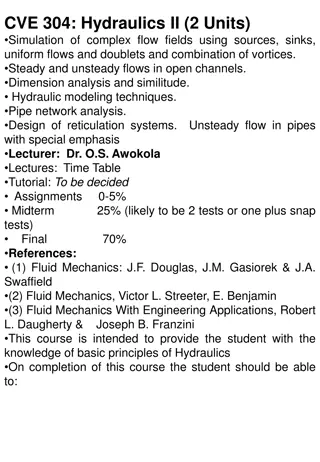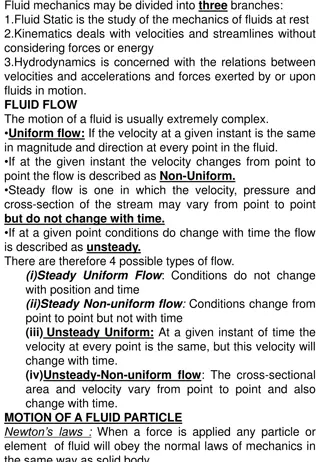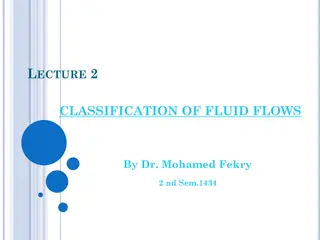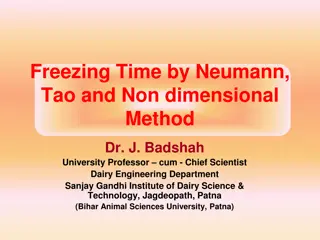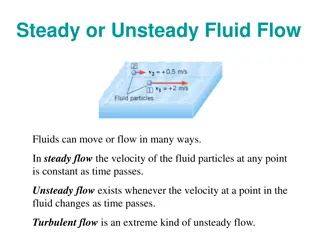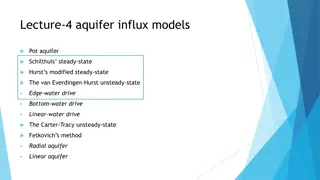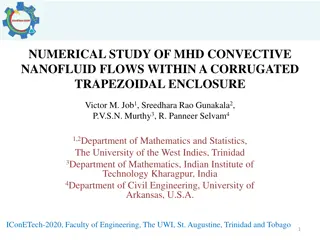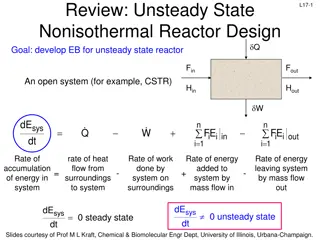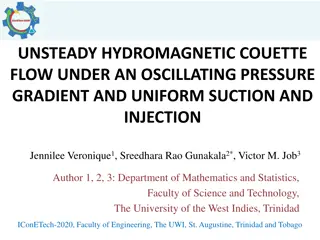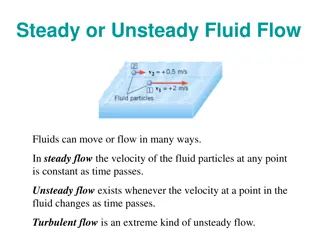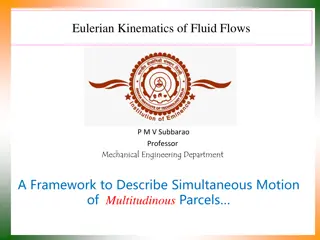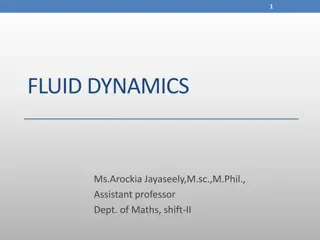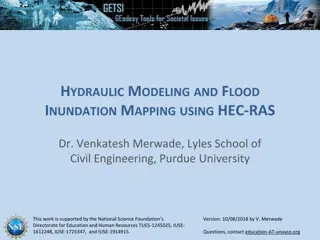Hydraulics II: Simulation and Analysis in Open Channels
Dive into Hydraulics II to explore complex flow fields, dimensional analysis, pipe network analysis, and design of reticulation systems. Learn about steady and unsteady flows in open channels, Chezy's and Manning's equations, and the different flow regimes in open channels. Gain insights into unifor
5 views • 5 slides
Overview of Fluid Mechanics: Branches, Flow Types, and Equations
Fluid mechanics is subdivided into three branches: Fluid Static, Kinematics, and Hydrodynamics. The study of fluid flow includes different types such as uniform, non-uniform, steady, and unsteady flow. The motion of fluid particles obeys Newton's laws, and the conservation of mass and energy plays a
1 views • 4 slides
Fluid Flows in Fluid Mechanics
Fluid Mechanics is the study of fluids in motion or at rest, and their interactions with solids or other fluids. Fluid flows are classified based on various characteristics such as viscous versus inviscid regions, internal versus external flow, compressible versus incompressible flow, laminar versus
1 views • 16 slides
Comprehensive Overview of Freezing Time Methods in Dairy Engineering
Neumann, Tao, and Non-Dimensional methods are key approaches for determining freezing times in unsteady state heat transfer processes in dairy engineering. The Neumann Problem, Tao Solutions, and Cleland and Earle Non-Dimensional Equation offer distinct equations and models to calculate freezing tim
1 views • 8 slides
Insights into Excess Backgrounds in Dark Matter Searches and Energy Accumulation Effects in Detectors
Explore the impact of excess backgrounds in dark matter searches, energy accumulation, and unsteady releases in detectors. Delve into the implications on low-energy-threshold detectors and the emergence of complex effects in various detector types due to energy accumulation and delayed releases.
3 views • 23 slides
Fundamentals of Fluid Flow: Steady, Unsteady, Compressible, Incompressible, Viscous, Nonviscous
Fluid flow characteristics such as steady vs. unsteady, compressible vs. incompressible, and viscous vs. nonviscous play crucial roles in understanding how fluids behave in various scenarios. Steady flow entails constant velocities over time, while unsteady flow involves changing velocities. Liquids
2 views • 11 slides
Aquifer Influx Models and Solutions
Explore various aquifer influx models such as Schilthuis, Hurst's modified steady-state, and the van Everdingen-Hurst unsteady-state. Learn about the challenges with the Schilthuis model and how to determine unknown constants. Dive into solutions and examples to enhance your understanding.
0 views • 23 slides
Numerical Study of MHD Convective Nanofluid Flows within Corrugated Trapezoidal Enclosure
Study investigates the influence of sidewall inclination angle and Eckert number on unsteady flow and heat transfer in alumina-water and SWCNT-water nanofluids within a trapezoidal enclosure. Motivation stems from the heat transfer enhancement in trapezoidal geometries compared to rectangular ones,
0 views • 19 slides
Chemical Reactor Design: Unsteady State and Nonisothermal Reactors
Developing energy balances for unsteady state and nonisothermal reactors is essential for designing efficient chemical reactors. The energy balances involve terms such as heat flow, work done, energy accumulation, and mass flow, which impact the reactor's performance. By considering factors like pha
0 views • 29 slides
Open Channel Hydraulics: Types of Channels, Flows, and More
Gain insights into open channel hydraulics covering topics like types of channels, various flows, velocity distribution, discharge mechanisms, and economical channel sections. Delve deeper into specific energy, hydraulic jump, gradually varied flow, and the distinction between steady/unsteady and un
0 views • 11 slides
Unsteady Hydromagnetic Couette Flow with Oscillating Pressure Gradient
The study investigates unsteady Couette flow under an oscillating pressure gradient and uniform suction and injection, utilizing the Galerkin finite element method. The research focuses on the effect of suction, Hartmann number, Reynolds number, amplitude of pressure gradient, and frequency of oscil
0 views • 17 slides
Fluid Flow: Steady vs. Unsteady, Compressible vs. Incompressible, Viscous vs. Nonviscous
Fluid flow can be categorized into different types such as steady or unsteady, compressible or incompressible, and viscous or nonviscous. Steady flow maintains constant velocity over time, while unsteady flow involves changing velocities. Liquids are typically incompressible, whereas gases can be co
1 views • 12 slides
Unsteady MHD Poiseuille Flow Through a Porous Channel
This study investigates unsteady magnetohydrodynamic (MHD) Poiseuille flow through a porous channel under an oscillating pressure gradient and uniform suction/injection. The objective is to obtain numerical solutions for the velocity distribution and analyze how the velocity is affected by various p
0 views • 16 slides
Material Derivative in Fluid Mechanics
Fluid flows are described using Eulerian kinematics and material derivative concepts, highlighting the changes in scalar and vector fields. The acceleration and components of material acceleration are explored, along with visualizations of material acceleration. Trajectories and displacements of flu
0 views • 13 slides
FLUID DYNAMICS
World of fluid dynamics, analyzing fluid motion, identifying types of fluids, studying streamlines, and understanding key assumptions. Delve into concepts like pathlines, streaklines, and the impact of steady vs. unsteady flows. Discover the fundamental principles in fluid dynamics presented in a cl
0 views • 11 slides
Hydraulic Modeling and Flood Inundation Mapping
A hydraulic model represents water systems and analyzes their hydraulic behavior. It helps in understanding system behavior across different scenarios, scales, and dimensions. Different types of hydraulic models include 1D, 2D, and 3D models, each serving specific purposes. One-dimensional (1D) hydr
0 views • 20 slides
Understanding Unsteady-State Heat Transfer and Simplified Methods
Discover the complexities of unsteady-state heat transfer and how it plays a crucial role in applied mathematics. Explore simplified methods for solving unsteady heat transfer problems and learn about the lumped heat capacitance method. Gain insights into the cooling of high conductive long cylinder
1 views • 27 slides
